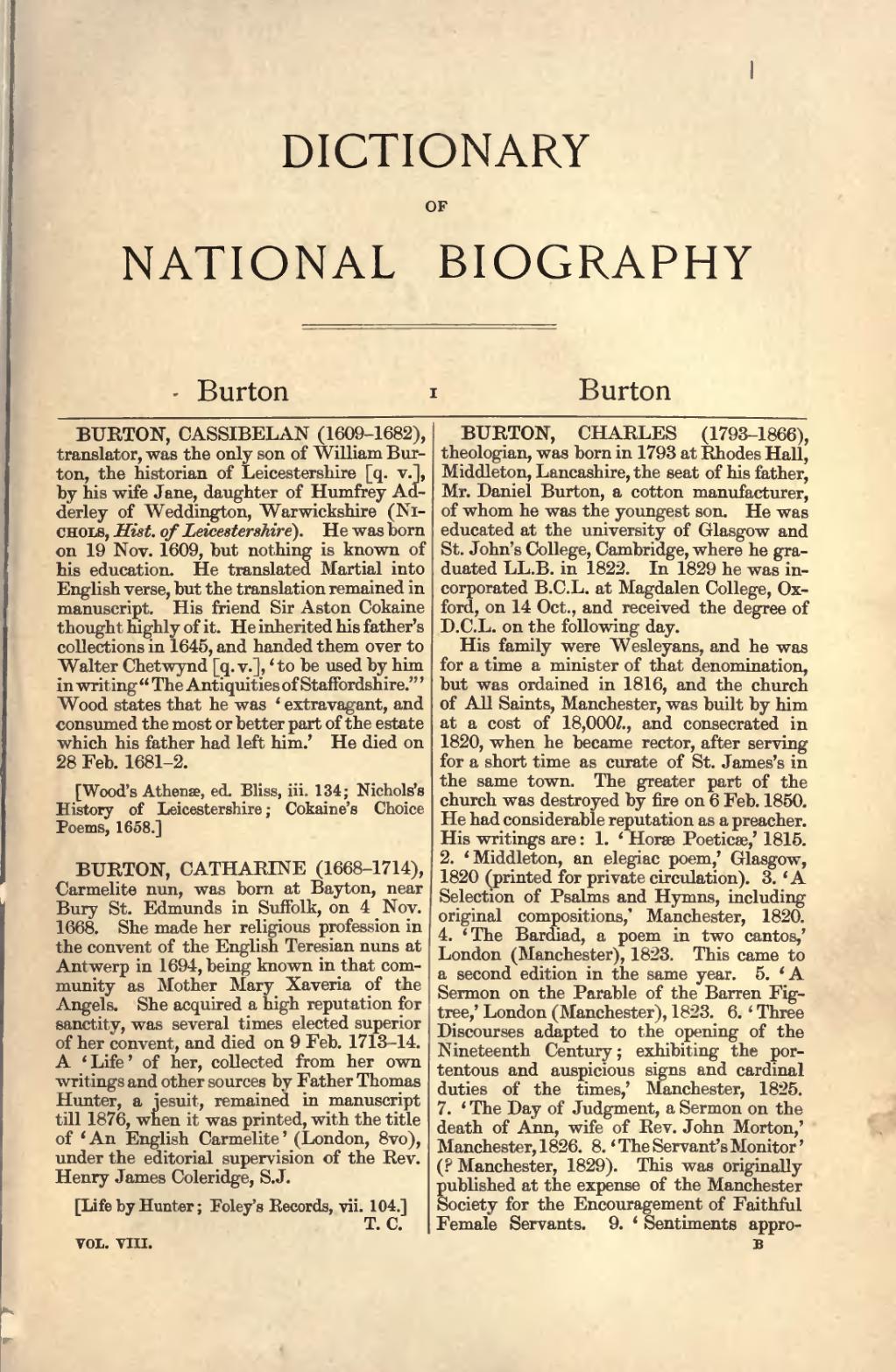DICTIONARY
OF
NATIONAL BIOGRAPHY
BURTON, CASSIBELAN (1609–1682), translator, was the only son of William Burton, the historian of Leicestershire [q. v.], by his wife Jane, daughter of Humfrey Adderley of Weddington, Warwickshire (Nichols, Hist. of Leicestershire). He was born on 19 Nov. 1609, but nothing is known of his education. He translated Martial into English verse, but the translation remained in manuscript. His friend Sir Aston Cokaine thought highly of it. He inherited his father's collections in 1645, and handed them over to Walter Chetwynd [q. v.], 'to be used by him in writing "The Antiquities of Staffordshire."' Wood states that he was 'extravagant, and consumed the most or better part of the estate which his father had left him.' He died on 28 Feb. 1681-2.
[Wood's Athenæ, ed. Bliss, iii. 134; Nichols's History of Leicestershire; Cokaine's Choice Poems, 1658.]
BURTON, CATHARINE (1668–1714), Carmelite nun, was born at Bayton, near Bury St. Edmunds in Suffolk, on 4 Nov. 1668. She made her religious profession in the convent of the English Teresian nuns at Antwerp in 1694, being known in that community as Mother Mary Xaveria of the Angels. She acquired a high reputation for sanctity, was several times elected superior of her convent, and died on 9 Feb. 1713-14. A 'Life' of her, collected from her own writings and other sources by Father Thomas Hunter, a Jesuit, remained in manuscript till 1876, when it was printed, with the title of 'An English Carmelite' (London, 8vo), under the editorial supervision of the Rev. Henry James Coleridge, S. J.
[Life by Hunter; Poley's Records, vii. 104.]
BURTON, CHARLES (1793–1866), theologian, was born in 1793 at Rhodes Hall, Middleton, Lancashire, the seat of his father, Mr. Daniel Burton, a cotton manufacturer, of whom he was the youngest son. He was educated at the university of Glasgow and St. John's College, Cambridge, where he graduated LL.B. in 1822. In 1829 he was incorporated B.C.L. at Magdalen College, Oxford, on 14 Oct., and received the degree of D.C.L. on the following day.
His family were Wesleyans, and he was for a time a minister of that denomination, but was ordained in 1816, and the church of All Saints, Manchester, was built by him at a cost of 18,000l., and consecrated in 1820, when he became rector, after serving for a short time as curate of St. James's in the same town. The greater part of the church was destroyed by fire on 6 Feb. 1850. He had considerable reputation as a preacher. His writings are : 1. 'Horæ Poeticæ,' 1815. 2. 'Middleton, an elegiac poem,' Glasgow, 1820 (printed for private circulation). 3. 'A Selection of Psalms and Hymns, including original compositions,' Manchester, 1820. 4. 'The Bardiad, a poem in two cantos,' London (Manchester), 1823. This came to a second edition in the same year. 5. 'A Sermon on the Parable of the Barren Figtree,' London (Manchester), 1823. 6. 'Three Discourses adapted to the opening of the Nineteenth Century; exhibiting the portentous and auspicious signs and cardinal duties of the times,' Manchester, 1825. 7. 'The Day of Judgment, a Sermon on the death of Ann, wife of Rev. John Morton,' Manchester, 1826. 8. 'The Servant's Monitor' (? Manchester, 1829). This was originally published at the expense of the Manchester Society for the Encouragement of Faithful Female Servants. 9. 'Sentiments appro-
